Barely out of the campaign chute, Republican presidential aspirant Tim Pawlenty is already suffering from a credibility gap.
The former Minnesota governor’s comprehensive economic and tax reduction plan unveiled last week is an array of $20 trillion in tax cuts for individuals and businesses over the next decade, premised on a bullish 5 percent annual economic growth--a level not seen since the mid 1980s. But he has yet to explain how his approach would offset the huge revenue loss to the federal government, and critics and nonpartisan economists say his projections are wildly optimistic and would lead to deeper deficits.
During the first major GOP debate in New Hampshire Monday night, Pawlenty struggled to defend his plan. “If Brazil can have 5 percent growth, if China can have 5 percent growth, then America can have 5 percent growth,” he said. Ahead of the debate, Pawlenty stumped for several days throughout New Hampshire touting his tax plan. In an interview with The Fiscal Times in Concord, Pawlenty was sanguine about his pitch. “We put out an aspiration goal of 5 percent,” he said. “Is that easy? No. Is it a stretch goal? Yes. But the numbers, whether it’s that number or something a little less, still work. The plan does balance, and more importantly it will get finally get jobs growing again in this country. We are proposing to cut taxes and cut spending. That hasn’t been done in recent decades in this country.”
The mild-mannered two-term Minnesota governor projects an air of competence, but he has struggled to excite crowds during his campaigning. “Among the different campaigns, we’re seeing a growing sense that the best shot to unseat Obama is to focus on the economy,” said Dean Spiliotes, a New Hampshire-based political analyst. “If we go on the assumption that Obama will be beaten on the economy, Pawlenty’s campaign is doubling down that dramatic proposals will get him traction with voters.”
Although the spotlight was primarily on former Massachusetts governor Mitt Romney at last night’s debate, Pawlenty appears to be trying to position himself as an alternative to the frontrunner by highlighting his blue-collar roots. Pawlenty was one of seven Republican contenders vying for the presidential nomination who took the stage at St. Anselm’s College in Manchester. But he ran into several speed bumps throughout the two-hour debate, raising new doubts about his ability to challenge Romney head on.
Most notably, Pawlenty puzzled pundits by passing up an opportunity to repeat an attack on Romney that he made on a talk show over the weekend by dubbing the Affordable Care Act “Obamneycare,” a term aimed at linking the health care reform policies of both Romney and President Obama.
Pawlenty waffled when asked by CNN moderator John King four times to address his previous attack on Romney. “I just cited President Obama’s own words, that he looked to Massachusetts as a blueprint or a guide when he designed Obamacare,” Pawlenty said. “President Obama is — is the person who I quoted in saying he looked to Massachusetts for designing his program. He’s the one who said it’s a blueprint and that he merged the two programs. And so using the term ‘Obamneycare’ was a reflection of the president’s comments that he designed Obamacare on the Massachusetts health care plan,” he added.
In the spin room immediately after the debate, Pawlenty’s campaign manager Nick Ayers struggled to explain why his candidate abandoned the comparison, POLITICO reported. “Governor Pawlenty’s his own guy. He said it himself on Fox on Sunday, and the way he chose to answer the question tonight is up to him, but he didn’t back off of it,” Ayers told reporters.
Pawlenty is portraying his controversial tax plan as a means of driving rapid economic growth and job creation. Under his proposal, the corporate income tax rate would be reduced to 15 percent from 35 percent. Individual federal income tax rates, which currently go as high as 35 percent, would be reduced to just two rates: 10 percent for the first $50,000 of income, and 25 percent for income above that. He also called for the elimination of all taxes on capital gains, interest income and dividends. And he advocates eliminating the federal estate tax.
Consistent with the mild tone of the GOP debate, the other candidates refused to criticize Pawlenty’s tax plan. “Tim has the right instincts,” Romney said politely.
Jobs and the economy dominated the evening, as Pawlenty stepped up his criticism of President Obama and coined a new term, calling him a “declinist” in the policies he pursues. On jobs, Pawlenty told The Fiscal Times: “The best thing we can do to grow jobs in this country is to shrink government because the people who want to start business or grow businesses and add jobs are telling us that the government’s load is too heavy and you are discouraging us,” he said. “We have to have an America where people are saying, ‘I want to start a business.’”
Related Links:
Tim Pawlenty Calls Obama “Declinist,” Backs off “Obamneycare” Line (CBS News)
Pawlenty Selling Snake Oil for a Budget Plan (The Fiscal Times)
Pawlenty Cast as Romney Alternative (Washington Post)





